HISTORY
In 2007, UC was the recipient of a substantial monetary gift with the intent to create a space exploration research effort as well as the establishment of two endowed chairs, the Thomas Jefferson Endowed Chair for Discovery and the Alan B. Shepard Endowed Chair for Exploration. Each of these chairs will further develop the intent of exploration and discovery through their own innovative research. In addition, this gift continues to inspire the next generation of scientist and engineers across multiple disciplines.
UC was also the academic setting for Neil Armstrong after he left NASA. As professor of aerospace engineering, he inspired the next generation of aerospace engineers.
In 2024, the Space Research Institute for Discovery and Exploration (SRIDE) became the Armstrong Institute for Space, Technology, and Research (ASTRO), honoring Neil Armstrong’s legacy at UC and expanding the institute's mission to lead the next era of space exploration.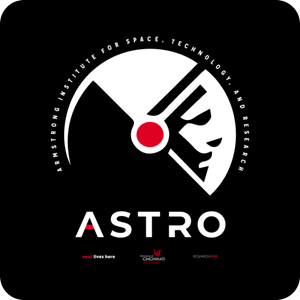
Meet the Director
Professor Charles Doarn serves as the director of the institute. Professor Doarn holds degrees from The Ohio State University and the University of Dayton. He is an Emeritus Professor in the Department of Environmental and Public Health Sciences within the College of Medicine. He spent 33 years with NASA as a program executive in the field of aerospace medicine and remote health care as it related to human spaceflight. His full CV can viewed here.
Director’s Message –
I am delighted to support the UC Office of Research in this new endeavor. Most of my career has been at the intersection of medicine, public health, engineering and program management. While I remain fully engaged in medicine and public health with ties to NASA, it is my program management skills that I will apply to this new institute in helping shape the University of Cincinnati’s efforts in aerospace through mutually-beneficial partnerships with NASA’s aerospace engineering activities, the United States Air Force at Wright Patterson, industry partners, academia, and the State of Ohio in expanding our boundaries in education and discovery. Each new graduate of our engineering and applied sciences program as well as other disciplines within our vibrant urban campus will be better prepared as a result of their involvement with our faculty, collaborators, and this institute. Feel free to contact me by phone at (513) 558- 6148 or by email at charles.doarn@uc.edu
Faculty Chairs
Thomas Jefferson Chair of Space Discovery
In 2010, Tomasz F. Stepinski, PhD, founded the Space Informatics Lab (SIL) in UC's Department of Geography. SIL develops intelligent algorithms and online tools for exploring large spatial datasets from planetary and Earth data. These tools enable scientists and the public to gain insights from complete datasets, such as automated mapping of Mars' craters and mineral maps, and Earth-wide landscape and climate searches. Dr. Stepinski, who holds a PhD in Applied Mathematics and an MS in Astrophysics, previously worked at the Lunar and Planetary Institute and currently teaches a freshman course, “Exploring the Solar System.”
Alan B Shepard Chair of Exploration
Ou Ma, PhD, is the Alan B Shepard Chair and Professor at the University of Cincinnati, where he directs the Intelligent Robotics and Autonomous Systems (IRAS) Lab. His research focuses on aerospace robotics and autonomous systems, including multi-robot teaming, human-robot interaction, satellite services, and smart manufacturing. Previously, Dr. Ma held faculty positions at New Mexico State University and worked at MDA Robotics, contributing to the development and support of Canadarm and Canadarm2 for the International Space Station, as well as projects with the German Aerospace Center and DARPA’s Orbital Express.
Advisory Board
The Institute is guided by a diverse group of subject matter experts internal and external to UC. These individuals, listed below bring interdisciplinary prowess to Institute, providing strategic advise as it grows in stature and capability. From time to time, individuals will join the Board.
Amit Bhattacharya, PhD
Professor
Department of Environmental and Public Health Sciences
UC College of Medicine
Dr. Bhattacharya, with a PhD in biomedical engineering and an MS in fluid mechanics, is a Professor at UC in Environmental Health, Biomedical Engineering, and Mechanical Engineering. He directs the EDDI Lab, focusing on early detection of degenerative disorders. His research includes wearable sensors for firefighters, genetic impacts on postural stability, cardio-synched vibration therapy for weightlessness, and noninvasive techniques for detecting neurotoxicity and early markers of osteoarthritis. His work on balance quantification for chemical toxicity was recognized by NIEHS. Dr. Bhattacharya serves on review panels for organizations like NIH and CDC and is a Fellow of the Biomedical Engineering Society.
John A. Benek, PhD
Senior Scientist
Air Force Research Laboratory, Aerospace Systems Directorate
Wright Patterson Air Force Base
John A. Benek, with over 50 years of experience, is the senior scientist for aeronautics at the Air Force Research Laboratory at Wright-Patterson AFB. He specializes in advanced wind tunnel testing, Computational Fluid Dynamics, and fluid dynamics modeling integration. Previously, he led the Computational Fluid Dynamics Department at AEDC and managed high-performance computing at Raytheon/Army Research Laboratory. A UC alumnus, Benek holds an MS and PhD in Aerospace Engineering from the University of Tennessee. He is a Fellow of AIAA, past chair of several AIAA committees, and a Distinguished Alumnus of UC.
Elaine Bryant, MS USAF (ret)
Director of Product, Distributed Manufacturing
Elaine Bryant is the Director of Product, Distributed Manufacturing, responsible for leading the distribution of advanced manufacturing factories using the DAPS manufacturing system to commercial and national security customers. Elaine has over 25 years of combined experience in the U.S. Air Force and Economic Development. Elaine is an Air Force Academy graduate with a degree in Aeronautical Engineering and holds an MS degree in aerospace from the University of Maryland and she was an Assistant Professor for Aeronautics at the Air Force Academy. Her experience in the Air Force includes program management and engineering leadership positions at AFRL, HQ AFMC, F-35 JPO, and SAF/AQR. She has served as a Commander at the United States Air Force Academy Cadet Squadron 24 and the National Air and Space Intelligence Center's Foreign Material Exploitation Squadron at Wright-Patt.
Kelly Cohen, PhD
Professor
Department of Aerospace Engineering and Engineering Mechanics
UC College of Engineering and Applied Science
Dr. Cohen is the Interim Department Head and Brian H. Rowe Endowed Chair in UC's Department of Aerospace Engineering and Engineering Mechanics. An Associate Fellow of AIAA and Senior Member of IEEE, he specializes in AI, intelligent systems, and UAVs. Prior to UC, he spent 22 years in military R&D, focusing on UAVs and air mobility. Since 2010, he has secured $6M in research funding and graduated 10 PhD and 26 MS students. With over 115 publications and 340 conference presentations, he also serves on editorial boards for journals like Unmanned Systems and Automation.
Richard J. Harknett, PhD
Professor and Chair
Department of Political Science
UC College of Arts and Sciences
Dr. Harknett is Professor and Head of Political Science and Chair of the Center for Cyber Strategy and Policy at UC, where he also co-directs the Ohio Cyber Range Institute. A former Scholar-in-Residence at US Cyber Command and the NSA, he helped shape the doctrine of cyber persistent engagement and has advised on Capitol Hill. He’s held Fulbright Scholar roles at Oxford and the Diplomatic Academy in Vienna. With over $19M in grant support and 60+ publications, he’s received multiple honors, including UC’s Provost Career Award and Ohio’s Faculty Innovator Award. Dr. Harknett is a dedicated Liverpool FC supporter.
Ashley Kubley, MFA
Associate Professor of Fashion Design
Associate Director of the Myron E. Ullman Jr. School of Design
Head of the Evelyn G. Burgoyne Textiles Innovation Laboratory
UC School of Design Architecture Art and Planning
Ashley Kubley is the Associate Director of the Myron E. Ullman Jr. School of Design and Head of the Evelyn G. Burgoyne Textiles Innovation Lab at UC. With 17 years in fiber and textile science, she focuses on smart materials and textiles innovation. Since 2017, she has collaborated with UC’s engineering program on Carbon Nanotube fabric for wearable technology. Her recent research, funded to explore Carbon Nanotube Hybrid Active Textile Systems, aims to enhance personal protective equipment for Ohio Fire Service in partnership with UC’s Colleges of Engineering, Medicine, and Design.
Tamara Lorenz, PhD
Associate Professor
Mechanical and Electrical Engineering
UC College of Engineering and Applied Sciences
Dr. Tamara Lorenz is an Associate Professor with joint appointments in Psychology, Mechanical Engineering, and Electrical Engineering at UC. Her research centers on intuitive human-machine interaction (HMI), especially with robots (HRI), AI, and VR, and involves modeling human-human and multi-robot interactions. Using multisensory data, she applies complex systems theory and machine learning to compare human and machine behavior over time. Her work spans healthcare, manufacturing, and early applications in space exploration. Dr. Lorenz directs UC’s Center for Cognition, Action, and Perception and serves on the leadership team for the UC Industry 5.0 Institute.
Ou Ma, PhD
Professor
Alan B. Shepard Endowed Chair for Exploration
Department of Aerospace Engineering and Engineering Mechanics
UC College of Engineering and Applied Science
Dr. Ou Ma, the Alan B. Shepard Chair Professor at UC’s Department of Aerospace Engineering and director of the Intelligent Robotics and Autonomous Systems Lab, specializes in space robotics, intelligent systems, and human-robot interaction. He has led numerous NSF, NASA, and industry-funded projects. Previously, he was the John Nakayama Professor at New Mexico State University and a senior engineer at MDA in Canada, where he contributed to Canadarm2 and DEXTRE for the ISS. Dr. Ma has published over 200 research papers and serves on editorial boards for robotics journals, including Frontier in Robotics and AI and Drones.
Scott Petersen, MS, MA, MBA
Executive Director
Digital Futures – Cyber Development
UC Office of Research
COL (USA, RET) Scott Petersen is an Executive Director of the Digital Futures initiative at
UC, focusing on Cyber, Unmanned Systems, AI R&D, and Department of Defense outreach. A former Army Engineer Officer with 30 years of service, he most recently led Strategy and Policy for the Army Cyber Directorate. Peterson has commanded engineer units at all levels, managed a $4B construction program for US Central Command, and served with US Special Forces. He holds master’s degrees in business, industrial-organizational psychology, and national resource strategy. His military awards include the Distinguished Service Medal, Defense Superior Service Medal, Legion of Merit (2), and Bronze
Star (3). Active TS (SCI-eligible) clearance.
Michael A. Riley, PhD
Professor
Department of Rehabilitation, Exercise, & Nutrition Sciences
College of Allied Health Sciences
Dr. Riley, Director of UC's Digital Futures Human Performance Lab, has been a UC faculty member since 2000. His research integrates biomechanics, neuroscience, and cognitive science, using AR/VR, motion capture, and modeling to study human coordination and learning. His work, aimed at rehabilitation and performance enhancement, has secured over $10M in funding from agencies like NSF and NIH. Dr. Riley has published over 125 peer-reviewed articles.
Paula Silva, PT, MS, PhD
Associate Professor
Department of Psychology
UC College of Arts and Sciences
Dr. Paula L. Silva, Associate Professor and co-director of graduate training in UC’s Psychology Department, is a primary faculty member at the Center for Cognition, Action, & Perception and collaborates with UC’s Digital Futures, particularly in the Bio-AI and Human Performance Labs. Her research explores human performance through complexity science and ecological psychology, focusing on action strategies across ages and abilities, perceptual adaptability, and resilience in individuals with disabilities or injury risks. Her work integrates theoretical principles with practical applications to enhance human performance.
Brianna Simms, PhD
Assistant Professor
Department of Chemistry
Dr. Briana Simms is an Assistant Professor in the Department of Chemistry. As an undergraduate researcher at Xavier University of Louisiana, Dr. Simms was a NASA Research Scholar focused on the development of hydrogel scaffolds that could be used as wound dressings. Currently, her research focuses on the development of novel polymeric biomaterials for applications in sustained therapeutic delivery and wound healing applications. The space-related research in her group currently focuses on the sustained delivery of critical vitamins and nutrients necessary for life.
Tomasz Stepinski, PhD
Professor
Thomas Jefferson Endowed Chair for Discovery
Department of Geography
UC College of Arts and Sciences
Tomasz Stepinski, the Thomas Jefferson Chair Professor of Space Exploration at UC’s Department of Geography and GIS, specializes in planetary science, computation, and data science. With a PhD in Applied Mathematics from the University of Arizona, he previously worked as a Staff Scientist at NASA’s Lunar and Planetary Institute. His research focuses on automating data extraction from large planetary datasets, including crater identification and landform mapping. Since joining UC in 2010, he has advanced space-based data utilization through intelligent algorithmic exploration, funded by grants from NSF and NASA.
Mary F. Wadel, MS
Director of Technology Integration and Partnerships
NASA’s Glenn Research Center
Cleveland, Ohio
Mary F. Wadel, with a master’s in aerospace and mechanical engineering from Case Western and a bachelor’s in aerospace engineering from UC, is the Director of Technology Integration and Partnerships at NASA’s Glenn Research Center. She aligns Glenn’s technology investments with long-term goals and regional economic development. Since starting at NASA in 1988 in rocket propulsion, she has held key roles, including Deputy Director of Aeronautics at Glenn and Deputy Director of Research at Langley. Recognized with the NASA Exceptional Service Medal and Collier Trophy, Wadel has managed projects in aeronautics and technology innovation.
Armstrong Fellowship Program
The Institute has established two fellowship programs, one for undergraduates and one for graduate
students. These awards will begin in January 2022.
They are:
- Armstrong Fellowship for Discovery — Undergraduates
- Armstrong Fellowship for Exploration — Graduate Students
More information can be found on our internal funding page.
Armstrong Discovery Fellows (undergrads)
Saaras Sridhar Pakanati
Mechanical and Materials Engineering
College of Engineering & Applied Science
Kaaustaaub Shankar
Computer Engineering
College of Engineering & Applied Science
Keta Thakkar
Statistics and Business Analytics
College of Arts and Sciences
Armstrong Exploration Fellows (graduate students)
William Cain
Aerospace Engineering and Engineering Mechanics
College of Engineering & Applied Science
Jinkyung Lee
School of Public and International Affairs
College of Arts and Sciences
Yang Li
Chemical and Environmental Engineering
College of Engineering & Applied Science
Maliha Marzana
Chemical and Materials Engineering
College of Engineering & Applied Science
Brianna Orrill
Geosciences
College of Arts and Sciences
Yuxin Yuan
Civil Engineering
College of Engineering & Applied Science
Armstrong Discovery Fellows (undergrads)
Sydney Dobler
Chemistry
College of Arts and Sciences
Kaaustaaub Shankar
Computer Engineering
College of Engineering & Applied Science
Armstrong Discovery Fellows (undergrads)
Sydney Dobler
Chemistry
College of Arts and Sciences
Kaaustaaub Shankar
Computer Engineering
College of Engineering & Applied Science
Armstrong Exploration Fellows (graduate students)
Prakash Giri
Mechanical and Materials Engineering
College of Engineering & Applied Science
Maliha Marzana
Aerospace and Engineering Mechanics
College of Engineering & Applied Science
Rachel Wiggins
Aerospace and Engineering Mechanics
College of Engineering & Applied Science
SRIDE Discovery Fellows (undergrads)
Sydney Dobler
Chemistry
College of Arts and Sciences
Ethan McCowan
Mechanical Engineering
College of Engineering & Applied Science
Grant Miller
Aerospace Engineering and Engineering Mechanics
College of Engineering & Applied Science
Steven Kraine
Computer Engineering
College of Engineering & Applied Science
SRIDE Discovery Fellows (undergrads)
Yashvi Srivastava
Aerospace Engineering
College of Engineering & Applied Science
Ross Thayer
Aerospace Engineering and Engineering Mechanics
College of Engineering & Applied Science
SRIDE Exploration Fellows (graduate students)
Nicole Carver
Psychology
College of Arts & Sciences
Dylan Roach
Aerospace Engineering
College of Engineering & Applied Science
Rebecca Gilligan
Mechanical Engineering
College of Engineering & Applied Science
Liang Zhang
Civil and Architectural Engineering and Construction Management
College of Engineering & Applied Science
Aida Ramusovic-Witham
Political Science
College of Arts & Sciences
Wilhelm Louw
Aerospace Engineering and Engineering Mechanics
College of Engineering & Applied Science
SRIDE Discovery Fellows (undergrads)
Prasanna Adhikari
Astrophysics/Mathematics
College of Arts & Sciences
Rebecca Gilligan
Mechanical Engineering
College of Engineering & Applied Science
Tri Nguyen
Aerospace Engineering
College of Engineering & Applied Science
Mikhail Nikolaneko
Computer Science
College of Engineering & Applied Science
Nathan Steffen
Aerospace Engineering
College of Engineering & Applied Science
SRIDE Discovery Fellows (undergrads)
Shraddha Barawkar
Mechanical Engineering
College of Engineering & Applied Science
Andrew Barth
Aerospace Engineering and Engineering Mechanics
College of Engineering & Applied Science
Piero Paialunga
Aerospace Engineering and Engineering Mechanics
College of Engineering & Applied Science
Elizabeth Rochford
Aerospace Engineering and Engineering Mechanics
College of Engineering & Applied Science
Matthew Verbryke
Aerospace Engineering and Engineering Mechanics
College of Engineering & Applied Science
SRIDE Exploration Fellows (graduate students)
Rebecca Gilligan
Mechanical Engineering
College of Engineering & Applied Science
SRIDE Discovery Fellows (undergrads)
Anirudh Chhabra
PhD student, College of Engineering and Applied Sciences — Aerospace Engineering and Engineering Mechanics
Daegyun Choi
PhD student, College of Engineering and Applied Sciences — Aerospace Engineering
Aida Ramusovic
PhD student, College of Arts and Sciences — Political Science
Benjamin Russ
MS student, College of Engineering and Applied Sciences — Mechanical Engineering
Yufeng Sun
PhD Student, College of Engineering and Applied Sciences — Aerospace Engineering and Engineering Mechanics
SRIDE Exploration Fellows (graduate students)
Rebecca Gilligan
College of Engineering & Applied Science
Recipient of the Inaugural SRIDE Fellowship
Kyle Dunlap
PhD student in Aerospace Engineering
Summer Semester 2021
Office of Research Pilot Studies
The Office of Research offers $25,000 pilot studies for 2-year studies; and they are open to all faculty across UC. SRIDE has two proposal opportunities each year.
2025 - 2027
Dr. Donghoon Kim (PhD) of the College of Engineering received a pilot study for his project entitled ‘Exploring the Righting Reflex of Animals to Develop Operational Strategies for Space Manipulator Systems’. His study will run May 2025 – August 2027.
Dr. Lei Wang (PhD) of the College of Engineering received a pilot study for his project entitled ‘Lunar Surface Exploration using Cooperating Multiple Robots’. His study will run May 2025 – August 2027.
2024-2026
Dr. Lindsey Elizabeth Romick (PhD) of the College of Medicine received a pilot study for her project entitled ‘Unraveling the Cosmic Secrets: Why Metabolomics is Essential for Space's Newfound Bacteria?’ Her study will run from May 2024 through August 2026.
Neil Armstrong Gifts to ASTRO
 Professor Doarn and Mr. Armstrong
Professor Doarn and Mr. Armstrong
On April 24, 2025, Mark Armstrong, son of astronaut Neil Armstrong gifted several items of his father’s collection. The Armstrong Institute for Space, Technology and Research (ASTRO) was named in honor of Neil Armstrong’s commitment to education and research here at the University of Cincinnati (UC). Armstrong was a professor of Aerospace Engineering at UC during the decade after his historic flight and walk on the moon in July 1969. Mr. Armstrong presented the gifts to Emeritus Professor and Director of ASTRO, Charles Doarn and the UC Foundation. The gift comprises two posthumous awards presented to Mr. Armstrong on behalf of his late father, several news clipping, a radiation experiment with Neil Armstrong’s handwritten instructions, and several correspondences with former UC Vice President of Research, George Rieveschl, Jr. Professor Doarn and Mr. Armstrong briefly discussed space exploration, his father’s legacy, and the ASTRO Fellowships. Professor Doarn presented Mr. Armstrong one of ASTRO’s mementoes. The Office of Research will review plans for displaying these items.
2024 Ohio Space Forum
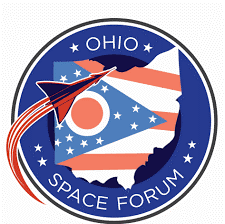
On April 29-30, 2024, JobsOhio conducted the 2024 Space Forum at the NASA Glenn Research Center in Cleveland. SRIDE was a Silver Sponsor. The Forum, which is held annually, highlights Ohio’s role in contributing to national security and space exploration. Dr. Kelly Cohen was a panelist on Ohio’s Excellence in Space Research, Moderated by Gen. Mark Bartman. This session highlighted the research areas that Ohio academic institutions are involved in that impact Ohio. In addition to Dr. Kelly, and several UC SRIDE Fellows and Dr. Ma’s PhD students attended.
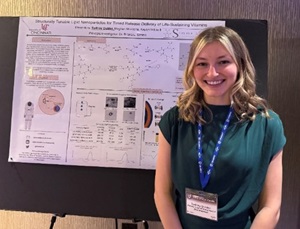 The 2024 event provided an opportunity for student presentations through the Ohio Space Forum University Partner Sponsorship. SRIDE supported two students to attend, Dylan Roach, Sydney Dobler, and Grant Miller. One of Dr. Ma’s PhD students, Conrad Kent, also attended. Mr. Kent’s poster, entitled ‘Hardware Tests of 3D Tumbling Motion Estimation of a Satellite’ received recognition as the 3rd best poster of the event.
The 2024 event provided an opportunity for student presentations through the Ohio Space Forum University Partner Sponsorship. SRIDE supported two students to attend, Dylan Roach, Sydney Dobler, and Grant Miller. One of Dr. Ma’s PhD students, Conrad Kent, also attended. Mr. Kent’s poster, entitled ‘Hardware Tests of 3D Tumbling Motion Estimation of a Satellite’ received recognition as the 3rd best poster of the event.
Sydney Dobler, SRIDE Discovery Fellow presented here work. Her advisor, Dr. Brianna Simms was also in attendance.
One of Dr. Ma’s student, Conrad Kent (not a SRIDE Fellow), tied for 3rd place in a student poster presentation during the Ohio Space Forum University Partner Sponsorship
Awards, Accolades and Recognition
Third Annual ASTRO Symposium
On November 20, 2025, ASTRO Fellows and advisors gathered for the FS2025 Annual ASTROASTRO Symposium. The gathering included remarks from Dr. Frank Gerner, interim Vice President of Research and Prof. Charles Doarn, ASTRO Director. The keynote address, entitled “Per Hominem Ad Astra: Perspectives in Aerospace Research at the intersection of Humanities, Neuroscience & Engineering" was given by Dr. Mariateresa Sestito, Chief Research Scientist, Boeing Center for Aviation and Aerospace Safety, Embry-Riddle Aeronautical University. The Armstrong Fellows of Discovery: Saaras Pakanati, Kaus Shankar and Keta Thakkar presented their work conducted over the FS25. The Armstrong Fellows of Exploration: Prakash Giri, Maliha Marzana and Rachel Wiggins presented their work over the period, August 2024 – August 2025. The new Armstrong Fellows of Exploration: William Cain, Jinkyung Lee, Yang Li, Maliha Marzana, Brianna Orrill and Yuxin Yuan gave a very short brief on their Fellowship, which began in August. The Office of Research Pilot studies were also presented. Drs. Lindsey Romick-Rosendale, Donghoon Kim, and Lei Wang presented their work. Drs. Kim and Wang’s work continues through 2027. Dr. Romick-Rosendale will complete here work in May 2026. At the conclusion of the event, Professor Doarn recognized the Fellows for their work.
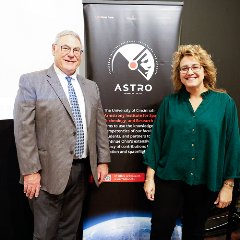 Prof. Doarn and Dr. Sesito
Prof. Doarn and Dr. Sesito
 ASTRO Fellows: (l-r) Keta Thakkar, Kaus Shankar, Prof. Doarn, Maliha Marzana, and Prakash Giri.
ASTRO Fellows: (l-r) Keta Thakkar, Kaus Shankar, Prof. Doarn, Maliha Marzana, and Prakash Giri.
Not pictured, Saaras Pakanati and Rachel Wiggins
ASTRO Fellows participate in the Spring 2025 Undergraduate Scholarly Showcase
Each year, our ASTRO Fellows of Discovery present their work at the Undergraduate Showcase in Tangeman University Center. SS2025 Fellows, Sydney Dobler and Kaus Shankar presented their work during a poster session. This event, held on April 24, marked the culmination of their SRIDE Fellowship of Discovery. Professor Doarn, ASTRO Director, recognized each Fellow with a memento of their fellowship.
 ASTRO Fellows: (l-r) K. Shankar, Professor Doarn, and S. Dobler
ASTRO Fellows: (l-r) K. Shankar, Professor Doarn, and S. Dobler
Third Annual ASTRO Symposium
ASTRO Fellows are a representation of our diverse students and the many disciplines here at UC. On November 21, 2024, ASTRO Fellows, faculty, and guests gathered in Tangeman University Center for the annual symposium. Armstrong Fellows of Discovery – Class 3.1 (Sydney Dobler and Kaus Shankar) and Armstrong Fellows of Exploration – Class 3.0 (Nicole Carver, Dylan Roach, Rebecca Gilligan, Liang Zhang, and Wilhelm Louw) presented their work. The incoming class of Discovery Fellows - Class 4.1) for SS 2025 (Sydney Dobler and Kaus Shankar) and the Exploration Fellows - Class 4.0 for 2024 – 2025 (Parkash Giri, Maliha Marzana, and Rachel Wiggins) each provided a high-level summary of their future work in 2025. ASTRO Director and Emeritus Professor Charles Doarn gave the keynote address, entitled ‘Human Exploration of Space – Challenges and Opportunities’. At the conclusion of the symposium, Professor Doarn recognized each Fellow with an acrylic embossed award.
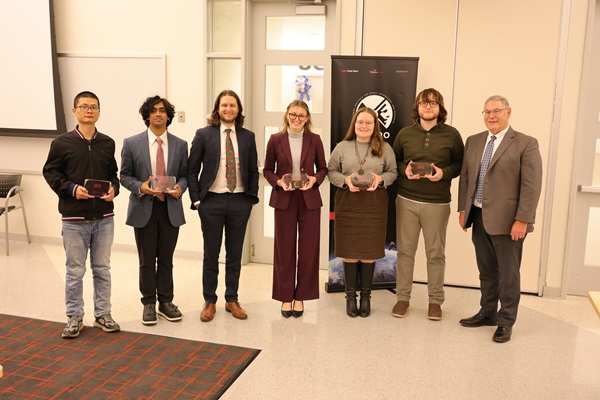 ASTRO Fellows: (l-r) Liang Zhang, Kaus Shankar, Wilhelm Louw, Sydney Dobler, Nicole Carver, Dylan Roach, and Professor Doarn.
ASTRO Fellows: (l-r) Liang Zhang, Kaus Shankar, Wilhelm Louw, Sydney Dobler, Nicole Carver, Dylan Roach, and Professor Doarn.
Not pictured, Rebecca Gilligan
Collaborative Research Advancement Program – Pilot Grants
The Office of Research offers two ‘space-related’ pilot grants each year. Dr. Lindsey Romick, an Associate Professor in the Division of Pathology and Laboratory Medicine, College of Medicine was awarded a two-year grant (2024 - 2026) for the
proposal entitled ‘Unraveling the Cosmic Secrets: Why Metabolomics is Essential for Space's Newfound Bacteria?’
SRIDE Fellows participate in the UC’s Undergraduate Scholarly Showcase
On April 16 2024, the SRIDE Fellows of Discovery participated in UC’s annual Undergraduate Showcases in Tangeman University Center. SS2024 Fellows Sydney Dobler, Steven Kraine, Ethan McGowan, and Grant Miller presented their work either in an oral
presentation or a poster session. This event marked the culmination of their SRIDE Fellowship of Discovery. Professor Doarn, SRIDE Director, recognized each Fellow with a memento of their fellowship.
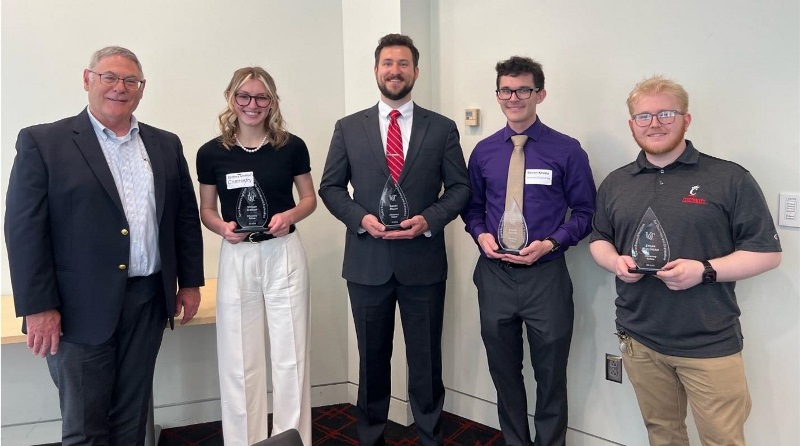 SS2024 SRIDE Fellows (l-r) Professor Doarn, S Dobler, G Miller, S Kraine and E McGowan
SS2024 SRIDE Fellows (l-r) Professor Doarn, S Dobler, G Miller, S Kraine and E McGowan
SRIDE Fellows participate in SRIDE's Annual Symposium
On November 16, 2023, the SRIDE held its annual symposium at Digital Futures. The keynote speakers were Ms. Mary Wadel, Director, Technology Integration and Partnerships and Ms. Jeanne King, Partnership Specialist & Technology Manager, NASA Glenn Research Center. Class 2 (Exploration Fellows) presented their final work (2022 – 2023). Class 2 included Shraddha Barawkar, Andrew Barth, Piero Paialunga, Elizabeth Rochford, and Matthew Verbryke. Class 2.1 (Discovery Fellows) Yashvi Srivastava and Ross Thayer presented their work (FS 2023). Class 3 (Exploration Fellows for 2023 – 2024) included Nicole Carver, Dylan Roach, Rebecca Gilligan, Liang Zhang, Aida Ramusovic-Witham, and Wilhelm Louw. They each gave a quick update on their work. This event marked the culmination of the SRIDE Fellows work. Professor Doarn, SRIDE Director, recognized each Fellow with a memento of their fellowship.
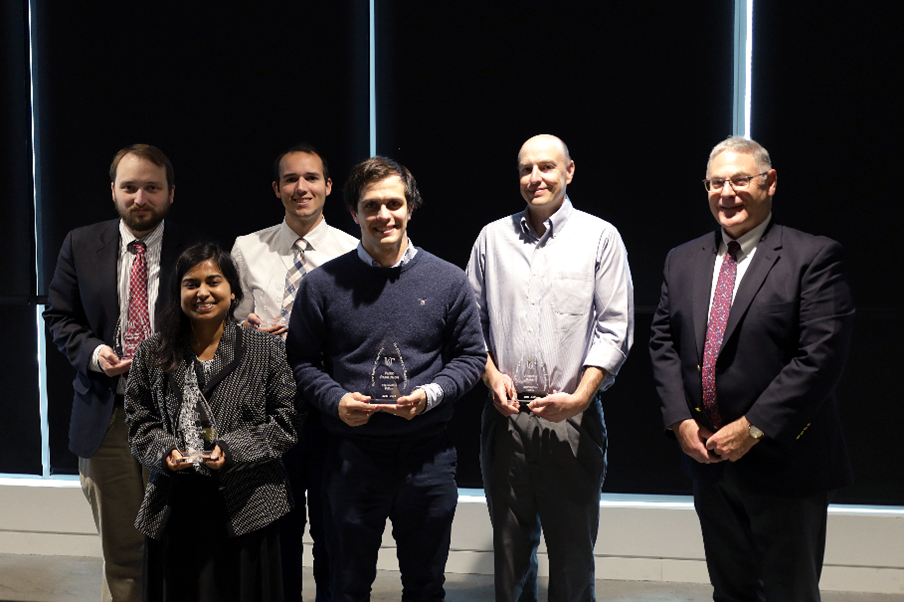 SS2023 SRIDE Fellows (l-r) M Verbryke, Y Srivastava, R Thayer, P Paialunga, A Barth, and Professor Doarn (not shown S Barawkar, E Rochford)
SS2023 SRIDE Fellows (l-r) M Verbryke, Y Srivastava, R Thayer, P Paialunga, A Barth, and Professor Doarn (not shown S Barawkar, E Rochford)
SRIDE Fellows participate in the UC’s Undergraduate Scholarly Showcase
On April 20, 2023, the SRIDE Fellows of Discovery participated in UC’s annual Undergraduate Showcases in Tangeman Hall. SS2023 Fellows (Prasanna Adhikari, Rebecca Gilligan, Tri Nguyen, Mikhail Nikolaneko and Nathan Steffen) presented their work
either in a poster presentation or podium presentation – Exploring the Beyond.
This event marked the culmination of their SRIDE Fellowship of Discovery. Professor Doarn, SRIDE Director, recognized each Fellow with a memento of their fellowship.
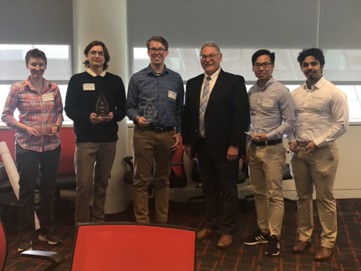 SS2023 SRIDE Fellows (l-r) R. Gilligan, M. Nikolaneko, N. Steffen, Professor Doarn, R. Nguyen and P. Adhikari
SS2023 SRIDE Fellows (l-r) R. Gilligan, M. Nikolaneko, N. Steffen, Professor Doarn, R. Nguyen and P. Adhikari
SRIDE Holds its Inaugural Symposium at Digital Futures

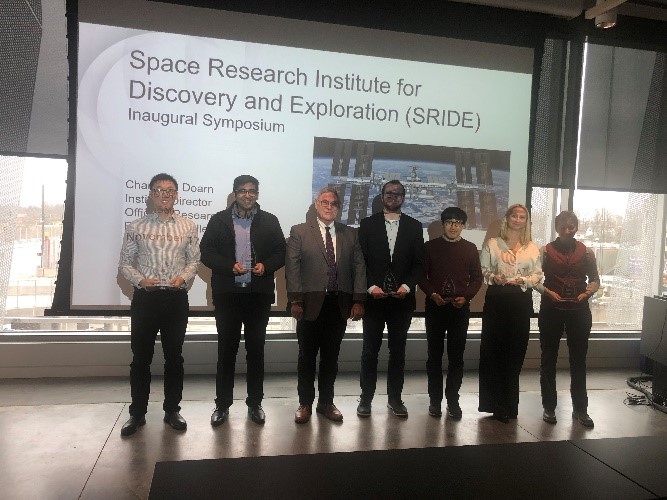
On November 17, 2022, SRIDE held it inaugural symposium at Digital Futures. The symposium provided an opportunity for the SRIDE Fellows of Discovery and Exploration to share their work. The first-class Discovery Fellows (Rebecca Gilligan) and Exploration
Fellows (Aida Ramusovic, Anirudh Chhabra, Benjamin Russ, Daegyun Choi and Yufeng Sun) provide excellent summaries of their research during this past year. The second class of Fellows provide a brief summary of their work in the ‘lightening round’.
The second class of Fellows include Rebecca Gilligan as Discovery Fellow and Shraddha Barawkar, Andrew Barth, Piero Paialunga, Elizabeth Rochford and Matthew Verbryke as Exploration Fellows. The meeting kicked off with remarks from Dr Patrick Limbach,
Vice President of Research. The keynote address was given by Dr. Kelly Cohen, UC College of Engineering and Applied Sciences. His address was entitled ‘Human-centered Trustworthy AI enabled Aeromedical and Biomedical Systems for Space Exploration.’
Doarn named a full member of the International Academy of Astronautics in July 2022.
SRIDE Director, Professor Charles Doarn was recently inducted as a full member of the International Academy of Astronautics. He was previously a corresponding member in the Life Sciences Section.
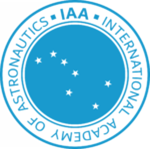
2022 –
- Javier Viaña Pérez was notified of his selection for the American Institute of Aeronautics and Astronautics (AIAA) John Leland Atwood Graduate Award. The award will be bestowed in January 2023 at the AIAA SciTech Forum, which will be
held at the National Harbour, MD
- Kyle Dunlap’s paper, entitled ‘Hybrid Fuzzy-LQR Control for Time Optimal Spacecraft Docking’, has been accepted to the 2022 NAFIPS conference.
- Viaña J, Ralescu S, Kreinovich V, Ralescu A, Cohen K were the winners of the Best Paper Award at the 2022 NAFIPS Annual Conference, May 31-June 3, 2022, Halifax, Nova Scotia, Canada. The paper was ‘Initialization and Plasticity of CEFYDRA
(Cluster-first Explainable FuzzY-based Deep self-Reorganizing Algorithm)’.
- Verbryke M, Cohen, K. were the winners of the Best Student Paper Award at the 2022 NAFIPS Annual Conference, May 31-June 3, 2022, Halifax, Nova Scotia, Canada. The paper was ‘Pulsar Candidate Selection Using a Genetic Fuzzy System’.
- Gilligan R, Cohen K. Winner of first place for best undergraduate student paper at the AIAA Student Competition, Region III, Purdue University, IN, March 25-26, 2022. The paper was ‘Design of an All-Terrain Aerial Robotic Interface (ATARI) as
a Collaborative Platform for UAVs”.
Internship Opportunities
The NASA Glenn Research Center in Cleveland, OH (https://www.nasa.gov/centers/glenn/home/index.html) has several internship opportunities. To find out more about these, please visit https://intern.nasa.gov.
Women in Flight at UC is a student organization whose mission is to create a close network of students with interest in the aviation/aerospace industries and to provide support academically, professionally, and socially while promoting the future generation of female students in STEM fields. Our members come from a wide variety of engineering disciplines with a like mindset of unity and support within the organization. The contact for this group in Rachel Wiggins wigginre@mail.uc.edu. Additional information can be found at www.ucwif.com.
Women in Medicine and Science (WIMS)
UC’s College of Medicine has a group entitled ‘Women in Medicine & Science (WIMS)’. This group is dedicated to the recruitment, advancement and retention of women faculty and trainees. Additional information on WIMS can be found at https://med.uc.edu/landing-pages/wims/. Dr. Heather Christensen is the current president. She can be reached at heather.christensen@uc.edu.
EVENTS AND NEWS
-
ASTRO Participates in the Keystone Conference
ASTRO director and emeritus professor, Charles Doarn, represented ASTRO and the University of Cincinnati at the 2024 Annual Conference of the Keystone Space Collaborative – Building Bridges. Breaking Barriers.
> Read StorySRIDE
-
Doarn Book Collection
Professor Doarn, the Inaugural Director of SRIDE donated to the UC Library an extensive collection of books, reports, and monographs from his career with NASA. These books come from NASA, the International Academy of Astronautics, the National Academy of Sciences, and the National Research Council.
> Read StorySRIDE
-
Ohio Space Forum 2023
Event from May 22-24, 2023
UC was a silver sponsor of the 2023 Ohio Space Forum.
> Read StorySRIDE
-
Ohio Global Aerospace and Supplier Summit
Event on May 16-17, 2023
SRIDE supported the Ohio Global Aerospace and Supplier Summit in Cleveland as a
silver sponsor
> Read StorySRIDE
-
Ohio Space Forum
Event on 5/17/2022
UC was a silver sponsor of the 2022 Ohio Space Forum.
> Read StorySRIDE
-
The Office of Technology Incubation and Innovation at NASA Glenn Newsletter
Our joint event with NASA Glenn was mentioned in the Office of Technology Incubation and Innovation at NASA Glenn Newsletter
> Read StoryThe Office of Technology Incubation and Innovation at NASA Glenn Newsletter
-
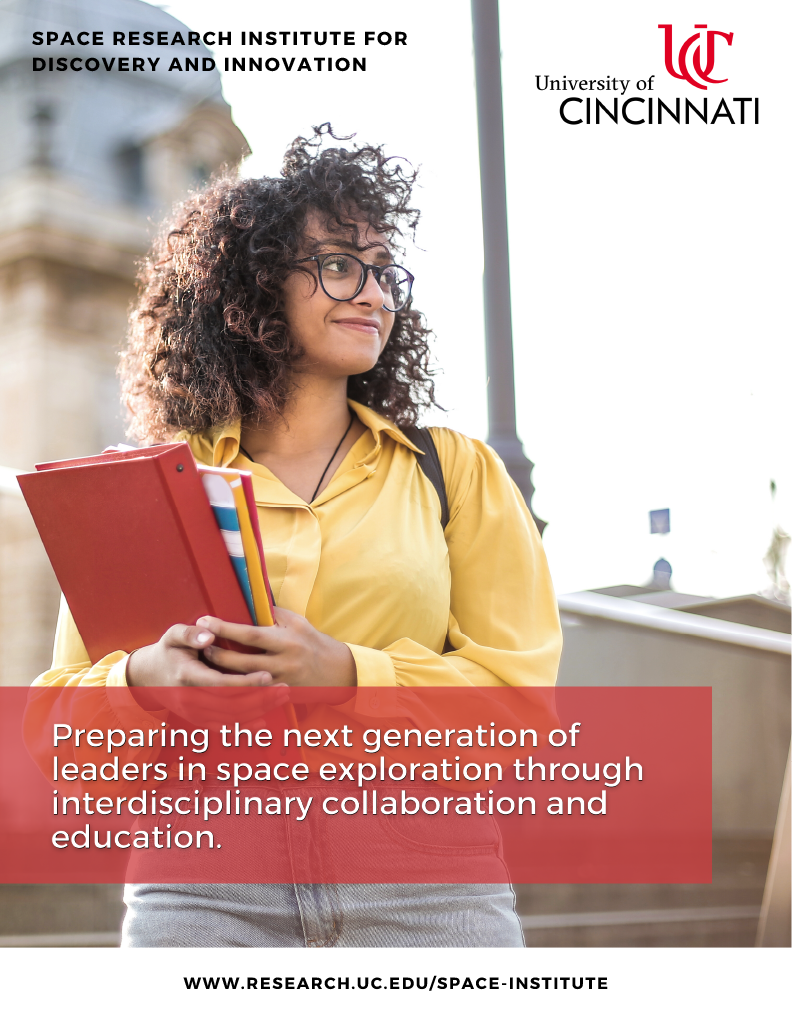
2021 Ohio Space Forum
Event on 5/18/2021
Professor Doarn and several UC faculty and students participated in the virtual Ohio Space Forum 2021 event. The forum, organized by the Dayton Development Coalition and JobsOhio, served as a platform for reviewing industry, academia and government’s efforts and opportunities for promoting Ohio’s role in the growing aerospace industry and how our multidisciplinary students fit into this. The Institute is part of UC’s vision of Research 2030 and Digital Futures. The event included remarks from Governor DeWine, both Ohio’s sitting senators, US and state representatives, the USAF, and NASA. Doarn participated in an academic panel along with professors from The Ohio State University, the University of Toledo, Cleveland State University, and The Eisenhower School – National Defense University. UC was a key sponsor, using the Institute’s tagline – “Preparing the next generation of leaders in space exploration through disciplinary collaboration and education.”
> Read Story2021 Ohio Space Forum
-
Future of Aeronautics: A Virtual Forum
Event on 3/19/2021
On March 19, 2021, the UC Space Research Institute for Discovery and Exploration hosted a virtual forum with the NASA Glenn Research Center (GRC). This event showcased the interests and opportunities for NASA to work closely with academia in a wide variety of areas and allowed us to align and strategize how UC's academic prowess in aeronautics and aerospace engineering could be applied through collaborations with NASA's aeronautics efforts.
> Read StoryThe Future of Aeronautics: Connecting UC, NASA, and Industry in Ohio
Potential Partners
Partnerships and collaborations are predicted on both need and interest. The following is a growing list of potential collaborators with which our faculty and students can become engaged with in pursuit of their academic training and potential future initiatives.
Publications (2015 - Present)
Our faculty and students participate in a wide variety of disciplines which result in scholarly output, including edited books, book chapters, peer-reviewed manuscripts, federal reports, perspectives and editorials. This output is listed here as a key reference list to current and future researchers. It also highlights the broad knowledge base ensconced here at UC that can serve as an enabling tool for collaboration.
Student-Led Papers (Student's Name is underlined)
- Gilligan R, Cohen K. “Design of an All-Terrain Aerial Robotic Interface (ATARI) as a Collaborative Platform for UAVs”, AIAA Student Competition, Region III, Purdue University, IN, March 25-26, 2022, Winner of first place for best undergraduate student paper.
- Dunlap K, Mote M, Delsing K, Hobbs KL. Run Time Assured Reinforcement Learning for Safe Satellite Docking. AIAA SciTech Forum. San Diego, CA. January 2022.
- Zhang L, Yuan Y, Cheng J, Wang L. Multivariate Adaptive Regression Splines for Two-stage Design Optimization of Bio-inspired Drilling into the Lunar Regolith. Struct Multidiscip Optim. 2025;68-92. DOI: 10.1007/s00158-025-04022-x.
Charles Doarn
- Doarn CR, Orlov O, Fomina A, Kussmaul A, Jennings R, Saniotis A, Häuplik-Meusburger S. Challenges in Medical Support for an International Human Expedition to Mars. Formal report to the IAA Study Group SG 2.14 Medical Support for an International Expedition to Mars. (Doarn and Orlov – Co-Chairs). ISBN/EAN IAA:978-2-917761-72-4. September 2024.
-
mHealth – A Comprehensive Overview of Telemedicine. Editors – TF Heston and CR Doarn. IntechOpen, London, United Kingdom. 2024. ISBN: 978-0-85466-797-0; Online – 978-85466-796-3
-
Doarn CR. An Interview with Dr. Stanley White, One of NASA's First Flight Surgeons. Aerosp Med Hum Perform. 2024 Apr 1;95(4):223-225. doi: 10.3357/AMHP.6353.2024. PMID: 38486320.
-
Nicogossian AE, Doarn CR. An American Perspective on the Legacy of Anatoly I. Grigoriev in Space Medicine. Aerosp Med Hum Perform. 2023 Sep 1;94(9):723-727. doi: 10.3357/AMHP.6252.2023. PMID: 37587635.
-
Doarn CR. Skylab Biomedical Accomplishments – Paving the Way to the International Space Station. Space Educ Strategic Appl. 2024;4(3):13-13; doi:10.18278/sesa.4.3.3.
- Doarn CR. Interview with Dr. Stanley White, One of America’s First NASA Flight Surgeons. Aerosp Med Human Perf. 2024;95(4):223-25.
- Book - Space Physiology and Medicine – from Evidence to Practice, 4th edition. Editors: A Nicogossian, CL Huntoon, RS Williams, CR Doarn, V Schneider, and JD Polk. 2016. Springer, New York. DOI-10.1007/978-1-4939-6652-3. ISBN 978-1-4939-6650-9 / e-book - ISBN 978-1-4939-6652-3
- Doarn CR, Shimada K, Shepanek M. The Legacy of the Wright State University Aerospace Medicine Residency Program. Aerosp Med Human Perf. 2021;92(9):744-50.
- Doarn CR, Polk JD, Grigoriev, Comtois J-M, Shimada K, Weerts G, Dervay JP, Taddeo TA, Sargsyan A. A Framework for Multinational Medical Support for International Space Station: A Model for Exploration. Aerosp Med Human Perf. 2021;92(2):129-34.
- OCHMO Mishap Investigation Flight Surgeon Handbook – NASA. Editors – JD Polk, CR Doarn. NASA SP-2020-5006891. NASA, Washington, DC. https://www.nasa.gov/feature/spaceflight-mishap-investigation-flight-surgeon-handbook
- Simpson AT, Doarn CR, Garber SJ. Interagency Cooperation in the Twilight of the Great Society: Telemedicine, NASA, and the Papago Nation. J Pol History 2020;32(1):25-51.
- Doarn CR. Polk JD, Shepanek M. Health Challenges Including Behavioral Problems in Long Duration Spaceflight. Neurol India. 2019;67(8):S190-95.
- Doarn CR, Travis TW, Currie-Gregg NK, Nicogossian AE, Weyland M, Shepanek M, Null C, Buckland D, Miller S, Liskowsky D, Fuller D, Francisco D, Walton M, Antonsen E, Rochlis J, Witt EG, Williams RS. Engineering, Life Sciences, and Health/Medicine Synergy in Aerospace Human Systems Integration: The Rosetta Stone Project: An Executive Summary. New Space. 2019;7(2):110-13. ePub – December 13, 2018
- Book – Engineering, Life Sciences, and Health/Medicine Synergy in Aerospace Human Systems Integration. The Rosetta Stone Project. Editors. RS Williams and CR Doarn. NASA SP-2017-633. NASA, Washington DC. ISBN 978-1-62683-044-8. https://ntrs.nasa.gov/archive/nasa/casi.ntrs.nasa.gov/20180001256.pdf
- Doarn CR. Evolution of Space Medicine at NASA. Aerosp Med Hum Perform. 2024;95(10):797-805. doi: 10.3357/AMHP.6472.2024. PMID: 39431696.
Ou Ma
- Sun Y, Ma O. “Learning-based approach to enable mobile robots to charge batteries using standard wall outlets”. Intelligent Service Robotics, 2024. doi.org/10.1007/s11370-024-00551-4.
- Alsamhi SH. Shvetsov AV, Guizani M, Ma O, Curry E. Blockchain-Empowered Security and Energy Efficiency of Drone Swarm Consensus for Environment Exploration. to appear in IEEE Transactions on Green Communications and Networking, 2022.
- Sun Y, Zhang L, Ma O. Force-Vision Sensor Fusion Improves Learning-based Approach for Self-Closing Door Pulling. IEEE Access. 2021;9. doi: 10.1109/ACCESS.2021.3118594.
- Barth A, Sun Y, Ma O. Genetic Fuzzy Based Method for Training Two Independent Robots to Perform a Cooperative Task. Intelligent Service Robotics. 2021;14:535-48, https://doi.org/10.1007/s11370-021-00379-2.
- Alsamhi SH, Almalki F, Ma O, Ansari MS, Lee B. Predictive estimation of optimal signal strength from drones over IoT frameworks in smart cities. IEEE Transactions on Mobile Computing. 2021.
- Papadopoulos E, Aghili F, Ma O, Lampariello R. Robotic manipulation and capture in space: A survey. Frontiers in Robotics and AI. 2021:228
- Sathyan A, Cohen K, Ma O. Genetic fuzzy based scalable system of distributed robots for a collaborative task. Front Robot AI. 2020;7:601243.
- Zhang L, Sun Y, Barth A, Ma O. Decentralized Control of Multi-Robot System in Cooperative Object Transportation Using Deep Reinforcement Learning. IEEE Access.2020;8:184109-184119.
- Alsamhi SH, Ma O, Ansari MS, Almalki F. Survey on Collaborative Smart Drones and Internet of Things for Improving Smartness of Smart Cities. IEEE Access. 2019;7:128125-128152.
- Sathyan A, Cohen K, Ma O. Comparison Between Genetic Fuzzy Methodology and Q-Learning for Collaborative Control Design. Int J Artificial Intelligence Appl. 2019;10(2):.
- Flores-Abad A, Zhang L, Zheng W, Ma O. Optimal Capture of a Tumbling Object in Orbit Using a Space Manipulator. J Intelligent Robotic Syst. 2017;86(2):199–211.
- Flores-Abad A, Ma O, Pham K, Ulrich S. A Review of Robotics Technologies for On-Orbit Services. Progr Aerosp Sci. 2014;68:1-26.
- Flores-Abad A, Ma O, Zheng W, Pham K. Optimal Controller for a Space Robot with Uncertainties in the Boundary Conditions. J Guidance Control Dynamics. 2014;37(6):2014-2017.
- Ma O, Flores-Abad A, Boge T. Use of industrial robots for hardware-in-the-loop simulation of satellite rendezvous and docking. Acta Astronautica. 2012;81(1):335-47.
- Lu Q, Ortega C, Ma O. Passive gravity compensation mechanisms: technologies and applications. Recent Patents on Engineering. 2011;5(1):32-44.
- Ma O, Dang H, Pham K. On-orbit identification of inertia properties of spacecraft using a robotic arm. J Guidance Control Dynamics. 2008;31(6):1761-771.
- Barth A, Ma O. “Cooperative Behavior of a Heterogeneous Robot Team for Planetary Exploration using Deep Reinforcement Learning”, Acta Astronautica, Vol. 214, 2024, PP. 689-700.
- Ma T, Zhang T, Ma O. “Global Reorientation of a Free-Fall Multibody System using Reconstruction Loss-based Deep Learning Method”, IFToMM Symposium of RoManSy & USCToMM Symposium on Mechanical Systems and Robotics, May 23-25, 2024, Tampa, FL.
- Sathyan A, Ma O, Cohen K. “Genetic Fuzzy Methodology for Decentralized Cooperative UAVs to Transport a Shared Payload”, Drones, 2023.
- Roach D, Barth A, Ma O, Fleming A. “PRO-based Trajectory Planning for Spacecraft Close-Distance Flight around a Client Satellite for Proximity Operations”, Proc. of 2023 AIAA Accelerating Space Commerce, Exploration, and New Discovery (ASCEND 2023), 2023, Las Vegas, NV.
- Sun Y, Ma O. “Drone-based Automated Exterior Inspection of an Aircraft using Reinforcement Learning Technique”, AIAA 2023 SciTech, National Harbor, MD, Jan 23-27, 2023.
- Sathyan A, Ma O, Cohen K. “Genetic Fuzzy Methodology for Decentralized Multi-UAV Cooperation with Physical Constraints”, AIAA 2023 SciTech, National Harbor, MD, Jan 23-27
Tomasz Stepinski
- Saeedimoghaddam M, Stepinski TF. Multiplicative random cascade models of multifractal urban structures. Physica A: Statistical Mechanics and its Applications. 2021;569:125767.
- Stepinski TF, Dmowska A. Complexity in patterns of racial segregation. Chaos Solitons Fractals. 2020;140:110207.
- Saeedimoghaddam M, Stepinski TF, Dmowska A. Renyi’s spectra of urban form for different modalities of input data. Chaos Solitons Fractals. 2020;139:109995.
- Dmowska A, Stepinski TF, Nowosad J. Racial landscapes – a pattern-based, zoneless method for analysis and visualization of racial topography. Appl Geograph. 2020;122:102239.
- Nowosad J, Stepinski TF. Information theory as a consistent framework for quantification and classification of landscape patterns. Landscape Ecol. 2019;34(9):2091-101.
- Nowosad J, Stepinski TF, Netzel P. Global assessment and mapping of changes in mesoscale landscapes: 1992–2015. Int J Appl Earth Observ Geoinformat. 2019:78:332-40.
- Nowosad J, Stepinski TF. Spatial association between regionalizations using the information-theoretical V-measure. Int J Geographic Inform Sci. 2018;32(12):2386-401.
- Nowosad J, Stepinski TF. Towards machine ecoregionalization of Earth's landmass using pattern segmentation method. Int J Appl Earth Observ Geoinformat. 2018;69:110-18.
- Netzel P, Stepinski TF. (2018) Climate Similarity Search - GeoWeb Tool for Exploring Climate Variability. Bull Amer Meteor Soc. 2018;99(3):475-77.
- Nowosad J, Stepinski TF. Global inventory of landscape patterns and latent variables of landscape spatial configuration. Ecolog Indicat. 2018;89:159-67.
Kelly Cohen
-
Cohen, K., “Grand Challenges in Intelligent Aerospace Systems”, Frontiers in Aerospace Engineering, 12 September 2023, Sec. Intelligent Aerospace Systems, Volume 2 - 2023 https://doi.org/10.3389/fpace.2023.1281522
-
Turner, L., Kelleher, M., Zahn, A., Sathyan, A., Warm, E., Furniss, D., Overla, S, Zheng, W., and Cohen, K., “Fuzzy Education: The potential for an Agentic AI System to Advance Precision Medical Education using Large Language Models, Fuzzy Logic and Shapley Values”, Manuscript #18, 2024 NAFIPS Annual Conference, May 27-29, 2024, South Padre Island, TX. Winner of Outstanding Paper Award
-
Wiedeman, W., and Cohen, K., “Robust Control of Linear Second-Order System by Genetic Fuzzy Tree”, Manuscript #31, 2024 NAFIPS Annual Conference, May 27-29, 2024, South Padre Island, TX.
-
Heitmeyer, D., Ouwerkerk, J.N., and Cohen, K., “Genetic Fuzzy Route Interception of Known Evader’s Path”, Manuscript #15, 2024 NAFIPS Annual Conference, May 27-29, 2024, South Padre Island, TX
-
Bede, B., Cohen, K., and Kreinovich, Editors, “Fuzzy Systems, Soft Computing and Explainable AI”,Proceedings of 2024 Annual Conference of the North American Fuzzy Information Processing Society, NAFIPS, Series Title: Studies in Systems, Decision and Control Series Editor, Janusz Kacprzyk, Springer Nature https://www.springer.com/series/13304
- Viaña J, Ralescu S, Ralescu A, Kreinovich V, Cohen K. Explainable Fuzzy Cluster-based Regression Algorithm with Gradient Descent Learning. Complex Engineering Systems. 2022;2: http://dx.doi.org/10.20517/ces.2022.14.
- Viaña J, Badenas-Agusti M, Vanderburg A, Seager S, Blouin S, Dufour P, López- Morales M, Cohen K. Enhancing Explainability with the Proximity Awareness Algorithm”, Nature Machine Intelligence (based on completed PhD thesis to be submitted in Summer 2022 in collaboration with MIT Kavli Space Institute).
- Viaña J, Ralescu S, Cohen K, Ralescu A, Kreinovich V. Why Cauchy Membership Functions, Explainability. Advances in Artificial Intelligence and Machine Learning. 2021;1(1):81-88.
- Gosian G, Cohen K. Sparse Requirements Systems Engineering and Implications for Assured Autonomy. J Defense Manag. 2021;11(6):No. https://www.longdom.org/open-access/sparse-requirements-systems-engineering-and-implications-for-assured-autonomy.pdf
- Book - Explainable AI and Other Applications of Fuzzy Techniques. Eds: Julia Rayz, Victor Raskin, Scott Dick, and Vladik Kreinovich. Springer ISBN: 978-3-030-82099-2
Chapters –
- A Fuzzy Logic Approach for Spacecraft Landing Site Selection. Barth A, Cohen K, Ma O.
- Why Fuzzy Techniques in Explainable AI? Which Fuzzy Techniques in Explainable AI? Cohen K, Bokati L, Ceberio M, Kosheleva O, Kreinovich V.
- Comparing the Explainability and Performance of Reinforcement Learning and Genetic Fuzzy Systems for Safe Satellite Docking. Dunlap K, Cohen K, Hobbs K
-
10 Chapters in - Cohen, K., Ernest, N., Bede, B., and Kreinovich, Editors, “Fuzzy Information Processing 2023”, Proceedings of 2023 Annual Conference of the North American Fuzzy Information Processing Society, NAFIPS, Series Title: Lecture Notes in Networks and Systems (LNNS), Series Editor, Janusz Kacprzyk, Springer Nature, Softcover ISBN978-3-031-46777-6, 22 January 2024. https://link.springer.com/book/9783031467776
-
6 Chapters in – Harbour, D. AR, Cohen. K., Harbour, S.D., Ratliff, B., Henderson, A., Pennel, H., Schlager, S., Taha, TM, Yakopcic, C., Asari, V., Boril, J., Sultana, A., Abouzahra, SN, Bulter, A., and Prikkel, C., “Martian Flight: Enabling Motion Estimation of NASA’s Next-Generation Mars Flying Drone by Implementing a Neuromorphic Event-Camera and Explainable Fuzzy Spiking Neural Network Model”, 43rd Digital Avionics Systems Conference (DASC 2024), San Diego CA, September 29-October 3, 2024.